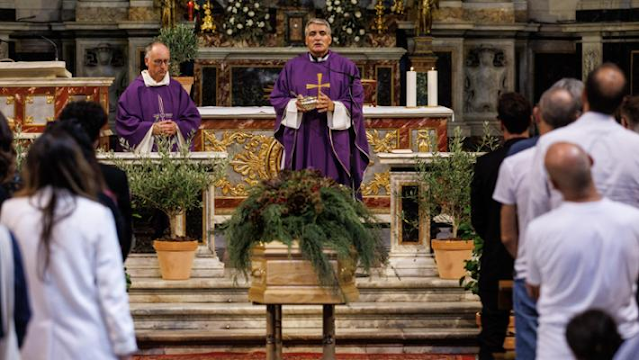Cardinal Zuppi sends message of condolence to funeral of author of God Save the Queer: A Feminist Catechism
Forbidden to criticise the 'sanctification of Murgia'. The clash between Catholics
See for background "Cardinal’s tribute to ‘God Save the Queer’ author reflects ‘both/and’ instinct"
The journalist Costanza Miriano, the Bishop of Sanremo, Don Antonio Suetta, and all those who disagree with the sanctification of the Murgia have been harshly criticised by Catholics themselves.
The figure of Michela Murgia seems to be heading towards sanctification, but someone in the Catholic world is starting to disagree. And he is immediately targeted on social networks (and not only).
"But what are we talking about? About a Christian and Catholic religion that has dominated millions of people for a couple of millennia, about the forced conversion over the centuries of heretics, non-believers and otherwise believers, or about the desire of two people who love each other to be able to marry and the consensus that this desire arouses?" thundered Marco Antei, President of Arcigay Imperia, on YouTube. He lashed out at the Bishop of Ventimiglia and Sanremo, Antonio Suetta, who had dared to criticise the stadium cheering that was seen during the Sardinian writer's funeral. Rai journalist Costanza Miriano, on the other hand, dared to write a long post on Facebook in which she said: 'That the world beatifies Murgia is therefore normal. That the Catholic media sincerely do not' and, in support of this thesis, she recalled Murgia's battles in favour of abortion, euthanasia and the gender theory. He added: 'I wonder why the Catholic media are affected by such a strong inferiority complex to exalt those who challenge the Catechism and our vision of man'. Open heavens! The fiercest criticism came from the Catholic world, and Miriano was forced to write a second post to reply to those who maintain that patents of catholicity cannot be given: 'Only God knows the heart, but it is those who take public and political positions opposite to those of the Catechism who are called out'. And he concludes: 'Pastors who want at all costs to show themselves to be open and flexible and fluid on the fundamentals (such as the truth of sexuality and marriage, for example) in truth, at bottom, do not really believe that sin makes man unhappy. So they are not as good as they would like to be, but they are responsible for the fact that so many men and women miss out on full happiness in their lives'.
Jacopo Coghe, spokesperson for Pro Vita & Famiglia, questioned by ilGiornale.it, is of the same opinion: 'In recent decades there has been a tendency to go towards the world, losing sight of the fundamentals of the Catholic Church. It is as if there were an inferiority complex towards the world and, therefore, a need to conform to worldly dictates, as Pope Francis would say'. According to Coghe, it is precisely this tendency that has led to a sort of sanctification of Murgia that in reality should not be there 'since she spread a profoundly anti-Christian thought'. And, in this context, whoever dissents is immediately challenged 'because,' says Coghe, 'we live in the era of political correctness, whoever dissents with respect to the dominant single thought must be silenced, annihilated and insulted, but we are not afraid and we maintain that Murgia is not a modern-day saint'. Mario Adinolfi, leader of the Popolo della Famiglia and a long-standing friend of Murgia's, remembers well when Murgia supported his candidature in the founding primaries of the PD (Italian Democratic Party) back in 2007 and how much their "common ecclesial background" united them. "It was only in the last ten years of her life that she developed and made public a real ideological drift that seemed obsessively prone to the most vicious feminism, to the war of the sexes masquerading as a fight against the 'Mesozoic patriarchy', which then eventually became a brutal fight against the natural family," explains Adinolfi, who wonders: "In the face of a world view that had transformed the good Catholic Action militant into a supporter of the better unspecified 'queer family', hostile to children, who considers marriage a mourning, who explicitly supports the uterus for rent, is there really anyone who has the courage to challenge Bishop Suetta's words? ". The Catholics who contest him, according to Adinolfi, live a cultural subalternity "towards the ideological garbage of contemporaneity that must be dismembered" and, to understand this, "it is enough to read the Gospel, which is much harsher than the translation to the 'love each other, anything goes' that some want to pass off by erasing the very concept of sin from the Magisterium of the Church".










.jpeg)

Comments